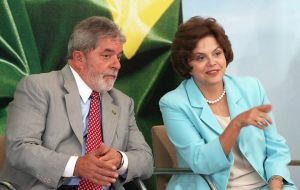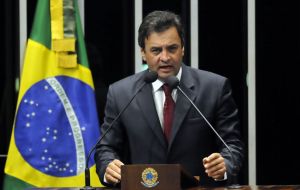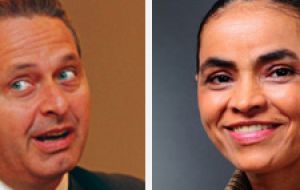MercoPress. South Atlantic News Agency
Brazilian 2014 presidential campaign takes off with Rousseff bidding re-election
 President Rousseff and her mentor Lula da Silva (R)
President Rousseff and her mentor Lula da Silva (R)  Senator Aecio Neves, the most probable candidate of the leading opposition party
Senator Aecio Neves, the most probable candidate of the leading opposition party  Potential spoilers, Pernambuco Governor Eduardo Campos and Marina Silva
Potential spoilers, Pernambuco Governor Eduardo Campos and Marina Silva Brazil's 2014 election season got off last week with the unofficial launch of President Dilma Rousseff's re-election campaign by her mentor and predecessor Lula da Silva during the celebration of the ruling Workers Party tenth year in power.
The main opposition party PSDB went on the offensive and attacked the decade of Workers' Party (PT) rule for undoing its work in laying the basis for Brazil's financial stability under former President Fernando Henrique Cardoso.
“They can get ready, they can organize, but our reply will be the re-election of Dilma in 2014,” Lula da Silva said to a packed Sao Paulo hotel ballroom.
Earlier in the week Rousseff announced that she has almost met her promise to eradicated extreme poverty by expanding social programs started by Lula da Silva. She spoke under a banner that looked decidedly like a campaign slogan: “Ending poverty is only the beginning”.
Despite her failure to match the rapid economic growth enjoyed by Lula da Silva, Rousseff's popularity is in the high 70s and she is facing weak opposition. Barring a major scandal in her government or an economic downturn that brings high inflation and unemployment, she is seen as the odds-on favourite to win the 2014 vote.
Rousseff has vowed to continue the PT's social plans aimed at improving the quality of life of Brazil's poor, though her government has turned to private business to help rebuild the country's dilapidated infrastructure. Some of her policy moves, such as in the energy sector have shaken investor confidence.
A PSDB victory in 2014 would restore more liberal policies that laid the ground for economic stability in the 1990s.
Rousseff's most likely opponent, PSDB Senator Aecio Neves, accused her of putting more effort into her re-election than governing the nation.
Neves took to the Senate floor to attack the president saying she had not delivered economic and industrial expansion, failed to draw investment that Brazil badly needs to upgrade its dilapidated infrastructure and undermined Brazil's fiscal credibility by juggling some government accounts.
He also criticized Rousseff for ”destroying” state companies like Petrobras and Eletrobras that suffered big falls in share prices due her government's delay in raising gasoline prices and by forcing a cut in electricity rates on power generators.
Under Brazilian electoral law, campaigning is not allowed until three months before the October 5, 2014 election. But the two main parties have good reason to start nos.
By launching Rousseff's re-election campaign, the PT is also pre-empting negative media attention it will likely get when three of the party's leaders are sent to jail this year in Brazil's biggest political corruption scandal over bribes to congressmen during the early days of Lula's first term.
The opposition PSDB will have its work cut out trying to defeat Rousseff, and needed to take the offensive early.
The PSDB's chances against Rousseff could improve with the entry of a third candidate with a lot of votes, such as former presidential candidate Marina Silva and her recently created Sustainability Network. Silva founded the Green Party and won 20 million votes to come in third in the 2010 presidential election.
Another possible spoiler is Eduardo Campos, the governor of Pernambuco state and leader of Brazil's fastest growing party, the Brazilian Socialist Party (PSB).
The centre-left PSB is a member of Rousseff's governing coalition of 17 parties, but could break away for a presidential bid by Campos, an effective administrator who has drawn foreign investment in big industrial projects in his fast-growing state.
During a speech to mayors in his home state last week, Campos was interrupted several times by cries of “presidente.”
He told local media that Brazil's future has nothing to gain from the “old feud” between the PT and the PSDB, suggesting that the country needs a different kind of leader.




Top Comments
Disclaimer & comment rules-

-

Read all commentsThe has-beens and losers will be coming out of the woodwork now, but why does Dilma need the crook da Silva unless the electorate are so stupid they cannot put 2 and 2 together?
Feb 25th, 2013 - 10:57 am 0http://en.mercopress.com/2013/02/25/brazilian-2014-presidential-campaign-takes-off-with-rousseff-bidding-re-election#comment220802: Well, Lula is the founding leader of PT. What do you think Dilma should do - snub him?
Feb 26th, 2013 - 02:49 am 0Commenting for this story is now closed.
If you have a Facebook account, become a fan and comment on our Facebook Page!